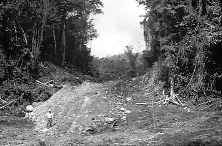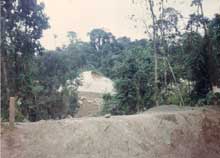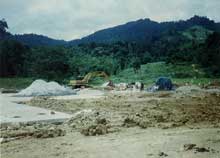What causes this destruction of the rainforests?

The rainforests are disappearing at a rate of acres per minute, a number that grows so quickly that it would be impossible to cite here because it would be outdated within a week. The rainforests are home to over half of the entire species of the world, which are being destroyed along with the forests. Unlike the rainforests, which may appear to grow back, it will never be the rainforests it once was, and all of those species that were killed will never return again. Many of those species of plants and animals have not been discovered or studied and they may be able to unlock the clues to the cures for cancer, AIDS, and many other diseases. If the rainforests disappear, so will most of the population of the world.
What causes this destruction of the rainforests?

*Growing economies with a growing demand for paper
and wood products.
*Population growth, poverty, and landlessness
that drive the poor to clear the forests.
*Mistaken economic policies that ignore and undervalue
forest preservation.
*Short-sighted political decision making that
is intended to please special interest groups by
offering land, access, roads, and so on.
*Corruption among governmental officials and
the illegal trade in drugs that are produced from plants grown in isolated
areas.
*Poverty, which pushes people into frontiers
in search of agricultural land and economic opportunities.
Commercial logging companies cut down mature tress that have been selected for their timber. The timber trade defends itself by saying that this method of "selective" logging ensures that the rainforest regrows naturally. Nevertheless, this is untrue. Large areas of the rainforest are destroyed in order to remove only a few logs. Also, the heavy machinery causes extensive damage to the environment. Trees are knocked over and the soil is compacted, which reduces it's ability to allow for the growth of other types of plants.
Want to read more about Logging?
Article:
Logging in Nicaragua
Article:
Deforestation's Knotted Reality
Article:
Production and Trade of Tropical Timber in the Latin America/Caribbean
Region
Notes
on Countries that produce Tropical Timber
Solutions: For
all purposes for which tropical timber is used, other woods or materials
could be substituted. As long as there is a market for timber from
the rainforests, trees will continue to be cut down. Labeling schemes,
aimed at helping consumers to chose environment friendly trees are being
discussed in many countries(1).


Mining and industrial development lead to direct forest loss due to the clearing of land to begin various projects. Indigenous people are then forced to move and roads are constructed trough what was once inaccessible land, opening up the rainforest. Severe water, air, and land pollution then occurs. Dams also open up previously inaccessible parts of the forest, spread diseases through the water, and damage downstream ecosystems. These industries benefit only the middle classes. In Brazil, for example, the Grand Carajas Project, a huge milling development to provide cheap raw materials for the world market, will occupy 900,000 sq. km, an area the size of Britain and France combined. It is affecting 23 tribal groups, and causing severe deforestation, soil erosion, air and water pollution.
A
Mining Strategy for Latin America created by the World Bank
Express your concerns to the World
Bank!
Solutions: Local
campaigns against mining and industrial development, and campaigns to reform
the large aid agencies which fund such schemes should be supported(2).
Previously, governments and international agencies believed that encouraging the colonization of the rainforests would alleviate poverty in the poorer countries of Latin America. It has now become obvious that this idea has failed, hurting the indigenous people and the environment(3).

The creation of national parks has helped the rainforests. Yet, these parks are open to the public, who in turn damage these environmental areas. Governments see tourism as an easy way of making money so they encourage tourism while deemphasizing any strict management of the forests. Ecotourism educates tourists to be environmentally aware, but many tourist companies are exploiting these forests for profit.
Solutions: The rights of the indigenous people and others who depend on the forests must be upheld. In instances where there are groups opposing tourist developments, they should be supported. Genuine ecotourism should be preferred to other tourist enterprises(4).
Nations of the Third Word have a collective debt
of $1,300 billion. In 1987, repayments and interest charges reached
$123.4 billion. These nations are being impoverished to make the
wealthy richer. There is a vicious circle that is being played over
and over again. Loans are used to finance environmentally destructive
projects, but they can only be repaid through further destructive resource
projects. The five countries with the largest rainforest areas are
also among the world's most heavily indebted countries. They are
now under great pressure to cut and clear rainforests to repay their debts(5).
Ranching is a major cause of deforestation, particularly in Central and South America. In Central America, two-thirds of lowland tropical forests have been turned into pasture since 1950. Meat is too expensive for many of the poor in these beef-exporting countries. In Brazil, ranching is used to claim land titles, often for speculative mineral development. Over half of the largest ranches in the Amazon have never sent cattle to market(6).
BEYOND BEEF, an examination of the problems cattle ranching has created for the rain forest and elsewhere.
Tell ARPEL what you
think about their oil extraction!
Visit
OPEC's Home Page
Visit
Venezuela's Oil Company (PDVSA)'s Home Page
Write
PDVSA a little email about what you think!
1. John Colchester and James Lohmann (eds.), The Struggle for Land and the Fate of the Forest. (London: Zed Books, 1993), 76-80.
2. Ibid, 80-81.
3. World Rainforest Movement. Rainforest Destruction: Cause, Effects, and False Solutions. (Penang: World Rainforest Movement, 1990), 12.
4. Ibid, 13.
5. John Revington, "The Causes of Tropical Deforestation," New Renaissance (3):2, 32-35.
6. Ibid, 36.